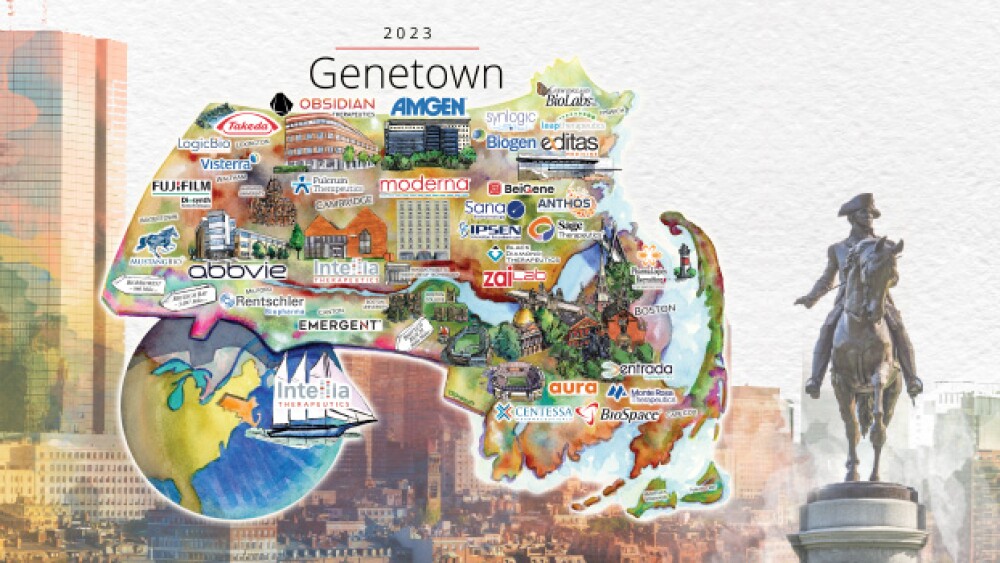At a panel Friday, “Boston’s Booming Biotech System,” experts from industry and academia weighed in on the financial repercussions of 2022 and what it portends for 2023.
Boston holds a tight grip on biotech, marked by a prodigious concentration of the life sciences industry, with the bank statements to prove it.
Nonetheless, at the “Boston’s Booming Biotech System” panel hosted Friday by Alnylam and The Boston Globe, experts from industry and academia weighed in on the financial repercussions of 2022 and what they portend for 2023.
Despite the 50-year history of the famed Kendall Square as a Genetown hub and center of many financial and scientific gains, the panel discussed whether the Boston area has become too big and too condensed with biotech to sustain its historic stronghold, particularly as the overall economy constricts.
“I used to say that the center of biomedical innovation is the Legal Sea Foods [restaurant] by the Whitehead Institute and MIT,” said John M. Maraganore, Ph.D., panelist and former founding CEO of Alnylam. “I mean it in the sense that in the old days, you’d go there to grab a lunch or a drink after work, and invariably, you’d run into an academic, you know, a colleague, collaborator, a founder or some venture capitalists.”
Compared to a record-breaking 2021, venture capital investments took more work to come by in 2022. As acquisitions chilled, the stalling economy sought to freeze growth.
Has biotech’s boom busted in Boston?
For the panelists, including Ruth Lehmann, Ph.D., director of the Whitehead Institute, and Robert Buderi, founder of Xconomy, the answer is a tentative no, still waiting.
Lehmann said the conversation is rooted in the pandemic transition to work from home, with Boston biotech working to adapt.
“We’ve completely revolutionized, I think, after these three years with a total overthrow of how we did work, and I think this will have very rapid consequences,” she said.
Maranganore cited remote work as possibly the heavyweight capable of smacking Boston biotech in the ring.
He said that remote work is the biggest threat to taking Boston out as an epicenter of biotech. Though working from home has its benefits, the costs exacted in creativity and innovation outweigh the positives.
“It’s tough to build strong cultures virtually or remotely,” Maranganore said. “For the Boston ecosystem, I think it does pose a threat … You can now find talent around the world; that’s a good thing. Still, I’m a big proponent of getting back to work in person now and believe that that will be an important part of keeping our vibrancy as an industry. We can lose it if we all work from the ski slopes. Or the beach.”
Buderi agreed. Pre-pandemic relationship-building made for quick collaborations based on relationships of trust to produce a COVID-19 vaccine.
“One reason there was so much success with vaccines is that the collaboration that went on during the pandemic was there already,” he said. “It was this base of trust among people worldwide because they had worked together previously; they knew each other. I’ve wondered if they won’t have those former close bonds the next time around.”
Further, Buderi said the lack of diversification in the types of companies most prominent in Boston might slow growth and rebound from a tough year.
“Walking through Kendall Square in recent years … There used to be such a mix of startups and startup spaces. And now it’s just one giant corporation after the other, and that’s true on the tech side and the life science side. That does take a little of the soul out of the place.”
Panelists remained optimistic about maintaining Boston’s foothold in the industry. Maranganore chalked 2022 up to part of economic cycling - something the industry has seen and overcome in years past.
“It happens in cycles. And this is a deep cycle,” he said.
“There’s no doubt this is a deep period, and there may be a larger number of companies that went public ahead of this cycle than we’ve seen in the past, which might make it seem a little bit more painful and make the capital a little bit more scarce.
But there’s no doubt this is just a typical cycle like we’ve seen in the past. The explosion of biomedical innovation and science from laboratory discoveries and the tools to translate these discoveries to go faster into medicines are unmatched. We’re just at the beginning of where this will all go.”





